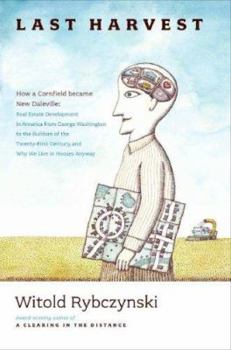Last Harvest: How a Cornfield Became New Daleville: Real Estate Development in America from George Washington to the Builders of the
Select Format
Select Condition 
Book Overview
When Witold Rybczynski first heard about New Daleville, it was only a developer's idea, attached to ninety acres of cornfield an hour and a half west of Philadelphia. Over the course of five years,... This description may be from another edition of this product.
Format:Hardcover
Language:English
ISBN:0743235967
ISBN13:9780743235969
Release Date:April 2007
Publisher:Scribner Book Company
Length:309 Pages
Weight:1.31 lbs.
Dimensions:1.1" x 6.4" x 9.3"
Customer Reviews
4 ratings
A Man A Plan- Daleville
Published by Thriftbooks.com User , 15 years ago
"The modest single-family house is the glory of the suburban tradition." "It offers its inhabitants a comprehensible image of independence and privacy while also accepting the responsibility of community."- Rober A.M. Stern Andres Duany is harshly critical of conventional suburban planning, "The classic suburb is less a community than an agglomeration of houses, shops, and offices connected to one another by cars, not by the fabric of life." But the developers of New Daleville have a dream: shared public spaces,walking paths, parks, all reminding people they are not only living in private homes but they are also members of a community. Instead of building ugly landscaped berms around ugly developments, people friendly communities should be well planned attractive and useful. They demonstrate how Rothenburg and other old European towns which are incredibly quaint, have the delicate relationship that exists between the large and small spaces. If you have any interest in suburban development, this is a well written, easy to understand book. Rybczynski tells of New Daleville a plan of developers in Pennsylvania who hope to turn a cornfield into a neotraditional neighborhood. The problem is that everyone hate developers; "Conservationists decry the loss of agricultural land; proponents of mass transit don't like spending more money on highway construction; environmentalists oppose continued dependence on fossil fuel, sociologist contend that low density suburbs undermine community..." Getting New Daleville built takes a lot of expertise, compromise, patience, money. ambition, and optimism about the future. Rybczynski has done a lot of research and has crunched a lot of numbers to tell the whole story with all the facts and makes it interesting.
Behind the scenes in real estate development
Published by Thriftbooks.com User , 16 years ago
If you work in a field related to real estate development, this is a great book to read. The author tracks the development of a small subdivision from initial planning to government permitting to final sales. All the while, he provides insight into the evolution of residential real estate sales in the US, and the varying perspectives of the main characters in the process. This is a great read for urban (and not-so-urban) planners. I highly recommend the book.
A 10-star book every housing consumer will relish
Published by Thriftbooks.com User , 16 years ago
This is a really really important book that unlocks dozens of mysteries of why we end up in the homes that we come to occupy and how communities are created from cornfields. In other hands, this could have been a tedious tract on housing economics and construction techniques, but the author is a masterful storyteller who thoroughly entranced me with an account of the birth of one modest housing development in the Philadelphia exurbs. Rybczynski clearly grasps that the essence of great drama is constant conflict, and, from nearly the first page to the last, he portrays the endless conflicts that pervade the homebuilding business: there's land developer versus the anti-development townspeople; the developer's vision of designing a pioneering new community versus the practical concern that consumers feel safer buying traditional homes; buyer versus builder in striking the deal; buyer's emotions versus buyer's practicality in concluding a home-buying decision; and so many more mini-dramas involving the dozens of other participants in the development process. As a long-time real estate professional, I learned a great deal from this book and would recommend it to everyone in the industry and to anyone who ever intends to buy a home, suburban, exurban, or even urban. It's a treasure chest of lore about the history of housing, mostly American, but also housing abroad.
Excellent
Published by Thriftbooks.com User , 16 years ago
Easy read that combines a little history and theory to help explain a personal story about designing and developing better neighborhoods. Rybczynski describes the rigorous process of developing communities that are not just streets and houses, but rather members of a complete community. I have recommended this book to many of my colleagues. It is a pleasure to read.




